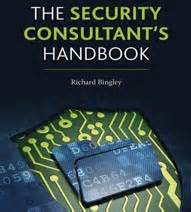Author: Richard Bingley
ISBN No: 9781849287487
Review date: 23/04/2024
No of pages: 354
Publisher: IT Governance (ITGP)
Publisher URL:
http://www.itgovernance.co.uk/shop/p-1726-the-security-consultants-handbook.aspx
Year of publication: 26/10/2015
Brief:
The Security Consultant’s Handbook by Richard Bingley
The only quibble about The Security Consultant’s Handbook is that the title doesn’t nearly do justice to how useful a book it is for anyone doing security, and wanting to improve themselves, writes Mark Rowe.
You know how you read a book that impresses you, and you think, if you don’t know the author, that you would like to meet him; or, if you have met him, the book puts him in an even better light? So it is with this book by Richard Bingley, a co-founder of the business advice network CSARN and a senior lecturer in security and organisational resilience at Buckinghamshire New University.
Now Professional Security magazine has been to Bucks New a few times over the years as the High Wycombe-based uni – and its security-related courses in particular – seeks to marry academic rigour with industry’s demands and practices. This book is apart from anything else a fine advert for Bucks New.
The author sums up: “Traditional threats and risks have by no means gone away. It’s just that the role of a modern security practitioner has shifted from being a predominantly protective site and assets person, into emerging as a leading contributor towards organisational resilience.”
I would say the weakest chapter, on safe business travel, is only guilty of covering the subject fully and usefully. Elsewhere the author is more original and helpful to the security consultant of the title, but in truth anyone looking to get on, both in the security business, and providing security to businesses. Take the opening chapter, ‘becoming an entrepreneur in the security business’. As that title suggests, Richard Bingley sets out his stall for entrepreneurship, if only (as he recalls on the very first page) non-security people are thinking about ‘diversifying’ into security; and (as he learns from Jason Towse of the contractor Mitie), margins in manned guarding have ‘all but evaporated’ and security providers have to do more to earn; they have to earn and keep the trust of clients.
As ready to quote business figures such as Sir Richard Branson as security specialists, Bingley advises that ‘perception is reality’, to do with conflicts of interest, for instance; and you ought to apply yourself in business (negotiation, for example) as much as security. Much the same goes in the next chapter, ‘becoming a developed security manager’, before he looks at specifics: laws and regulations to do with private security; private investigations in the light of the Leveson Inquiry; and protective security (close protection) and information security. Now infosec is so often the touchstone of a work about security; as it’s so easy to make it worthy but dull, or plain unintelligble. Bingley shows an assured touch taking us through what so often is an interface between physical, information and cyber security, never forgetting that infosec is for a purpose (such as, competitive edge) and not an end in itself. The book is up to date enough to feature the Sony Pictures Entertainment hack in the United States last year.
As someone who feels comfortable about quoting Nietzsche, the author has produced a most assured work; a book for our times; and one for the newcomer to security and anyone wanting to refresh themselves or get a grip on 2015 in general.
A cracking book from a man who is giving the security industry a good name.










